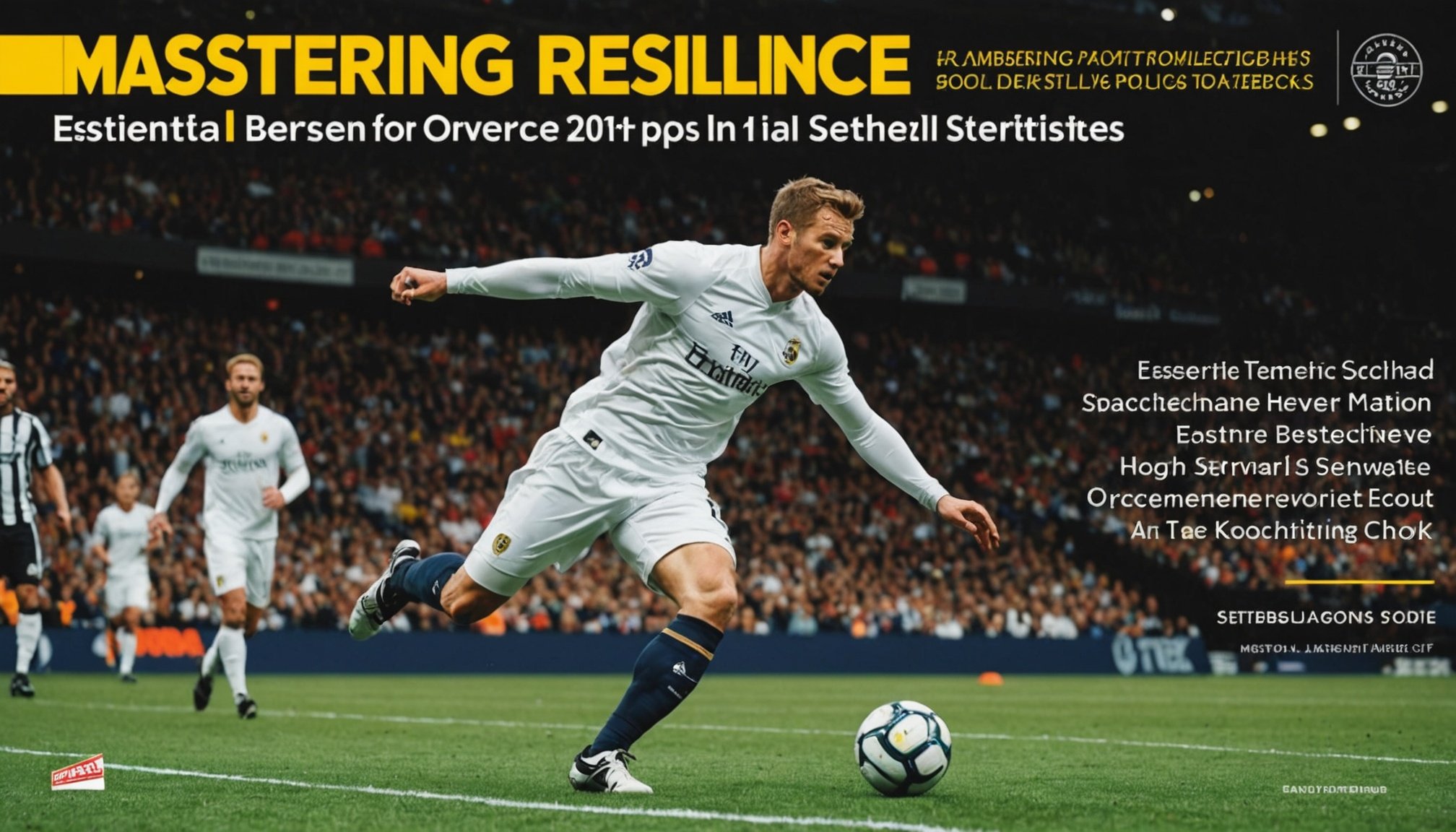Mastering Resilience: Essential Strategies for Athletes to Overcome Major Setbacks in Sports
Understanding the Importance of Resilience in Sports
Resilience is a crucial component of an athlete’s arsenal, enabling them to bounce back from setbacks, injuries, and failures. In the high-pressure world of sports, athletes are constantly faced with challenges that can test their mental and physical limits. According to Emily Hemendinger, Clinical Director of the OCD Program and Assistant Professor of Psychiatry at the University of Colorado School of Medicine, “the intense drive and perfectionism often seen in athletes can lead to what she calls ‘automatic negative thoughts’ or ‘ANTS’”[1].
These negative thoughts can significantly interfere with an athlete’s life, leading to a cycle of anxiety, depression, and other mood disorders that impact both mental and physical performance. Here’s why resilience is not just a nice-to-have, but a must-have for athletes:
In the same genre : Unlocking Mental Wellness: The Positive Psychological Impact of Team Sports on Teenagers
- Mental Toughness: Resilience helps athletes develop mental toughness, the ability to perform at their best even under pressure or in challenging circumstances[2].
- Coping with Setbacks: Athletes who lack resilience may struggle to bounce back from injuries or disappointments. Resilience teaches them to view challenges as opportunities for growth[3].
- Improved Performance: By developing resilience, athletes can improve their overall performance, making better decisions and maintaining their performance over time[2].
Strategies for Building Resilience
Building resilience is not an overnight process; it requires systematic and consistent effort. Here are some key strategies that athletes can use to develop their resilience:
Acceptance and Balanced Thinking
Emily Hemendinger emphasizes the importance of acceptance and balanced thinking. Instead of trying to forcefully reframe or dismiss negative thoughts, athletes should acknowledge them without letting them take over. For example, instead of saying, “I’m a failure,” one could say, “I’m having the thought that I’m a failure.” This subtle shift creates space between the individual and their thoughts, reducing the emotional impact and preventing the thoughts from becoming overwhelming[1].
Also to read : Transform your workout recovery with massage guns today !
Mindfulness and Meditation
Practices like mindfulness, meditation, and even journaling (when done mindfully) can help athletes stay present and avoid being consumed by negative thoughts. These techniques help athletes stay calm and focused in high-pressure situations, which is essential for peak performance[2].
Positive Self-Talk
Positive self-talk is another powerful tool in building resilience. Athletes can use positive, encouraging language to build confidence and stay motivated. For instance, instead of focusing on what went wrong, an athlete could say, “I did my best, and I can improve next time.”[2]
Goal Setting
Setting specific, measurable goals can help athletes stay focused and motivated. Goal setting provides a clear direction and helps athletes break down larger objectives into manageable steps, making the journey less daunting and more achievable[2].
Techniques from Sport Psychology
Sport psychology offers a range of techniques that can help athletes develop the mental skills necessary for resilience.
Visualization
Visualization involves mentally rehearsing a specific scenario or performance, imagining oneself performing at their best. This technique can enhance confidence and prepare athletes for different situations they might face during a game or competition[2].
Attentional Control
Techniques such as cue words or focusing on a specific aspect of the game can help athletes maintain focus and concentration. Attentional control is crucial in high-pressure situations where distractions can be costly[2].
Social Support
Social support from coaches, teammates, and family is vital for building resilience. Having a strong support system can provide emotional support and help athletes develop coping strategies to navigate the complexities of sports and life beyond the game[3].
Practical Insights and Actionable Advice
Here are some practical insights and actionable advice for athletes looking to build their resilience:
Developing a Growth Mindset
A growth mindset is essential for resilience. Athletes should view challenges as opportunities for growth rather than threats to their ego. This mindset helps in developing a more positive and adaptive approach to setbacks[5].
Building Self-Confidence
Self-confidence is a cornerstone of resilience. Athletes can boost their self-esteem by overcoming mental blocks and building mental resilience. This can be achieved through systematic mental training and positive self-talk[3].
Managing Stress
Athletes often juggle multiple responsibilities, from training to academics. Therapy and counseling can provide a safe space to express feelings and develop strategies to manage stress effectively. Techniques such as deep breathing, meditation, and body scans can also help athletes stay calm and focused[3].
Real-Life Examples and Anecdotes
Several elite athletes have exemplified the importance of resilience in their careers.
Simone Biles
Simone Biles, the renowned gymnast, is a prime example of resilience in action. Despite facing immense pressure and personal challenges, Biles has consistently demonstrated her ability to bounce back and perform at the highest level. Her decision to prioritize her mental health during the Olympics highlights the critical role resilience plays in an athlete’s success[3].
Naomi Osaka
Naomi Osaka, the tennis star, has also been open about her mental health struggles. Her journey shows how resilience, coupled with the right support and strategies, can help athletes navigate the pressures of their sport and achieve success both on and off the field[3].
Table: Comparing Different Types of Therapists for Athletes
| Type of Therapist | Focus | Benefits | Techniques Used |
|---|---|---|---|
| Sports Physical Therapist | Physical aspects of sports performance | Helps athletes recover from injuries, improves physical capabilities | Therapeutic massage, physical rehabilitation |
| Sports Psychologist | Mental side of sports | Helps athletes manage performance anxiety, build mental toughness, improve focus | Visualization, goal-setting, positive self-talk, mindfulness |
| Mental Health Professional | Broader mental health concerns | Addresses anxiety, depression, identity issues; provides emotional support and coping strategies | Cognitive-behavioral therapy, emotional support, stress management |
Detailed Bullet Point List: Coping Strategies for Athletes
Here are some detailed coping strategies that athletes can use to build resilience:
-
Mindfulness and Meditation:
-
Practice deep breathing exercises to calm the mind and body.
-
Engage in regular meditation sessions to stay present and focused.
-
Use body scans to release physical tension and promote relaxation.
-
Positive Self-Talk:
-
Use affirmations to build confidence and stay motivated.
-
Focus on positive outcomes rather than negative thoughts.
-
Practice self-compassion by treating oneself with kindness and understanding.
-
Goal Setting:
-
Set specific, measurable, achievable, relevant, and time-bound (SMART) goals.
-
Break down larger goals into smaller, manageable steps.
-
Celebrate small victories to maintain motivation.
-
Social Support:
-
Build a strong support network of coaches, teammates, and family.
-
Seek help from mental health professionals when needed.
-
Engage in team-building activities to foster a sense of community and support.
-
Visualization:
-
Mentally rehearse different scenarios and performances.
-
Imagine oneself performing at their best.
-
Use visualization to prepare for different situations that might arise during a game or competition.
-
Attentional Control:
-
Use cue words to maintain focus and concentration.
-
Focus on a specific aspect of the game to avoid distractions.
-
Practice attentional control during training sessions to improve performance under pressure.
Mastering resilience is a journey that requires dedication, the right strategies, and a supportive environment. By understanding the importance of resilience, using techniques from sport psychology, and incorporating practical coping strategies, athletes can build the mental toughness needed to overcome major setbacks and achieve peak performance.
As Emily Hemendinger aptly puts it, “By embracing acceptance and balance, athletes and non-athletes alike can build resilience and lead a more satisfying life.” By prioritizing mental health and using the strategies outlined above, athletes can unlock their full potential and achieve success both on and off the field.
In the words of Nicky Tamberrino, “Steady and efficient” is not just a mantra for a challenging hike; it’s a mindset that can guide athletes through the ups and downs of their sports careers. By staying grounded, focused on the present moment, and avoiding negative thoughts or unrealistic expectations, athletes can build the resilience they need to succeed in the ever-demanding world of sports.











